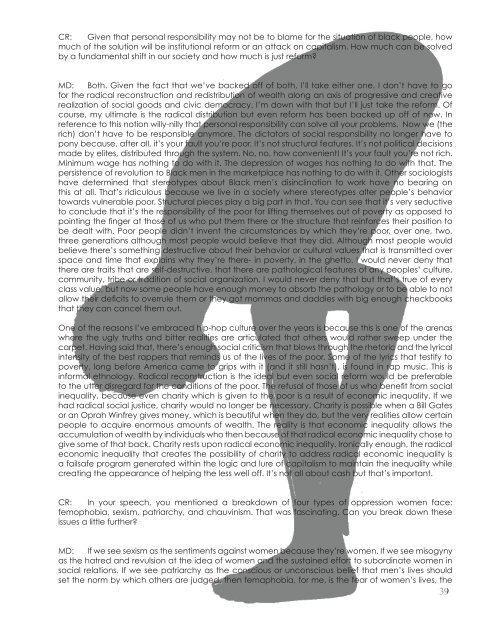Create successful ePaper yourself
Turn your PDF publications into a flip-book with our unique Google optimized e-Paper software.
CR: Given that personal responsibility may not be to blame for the situation of black people, how<br />
much of the solution will be institutional reform or an attack on capitalism. How much can be solved<br />
by a fundamental shift in our society and how much is just reform?<br />
MD: Both. Given the fact that we’ve backed off of both, I’ll take either one. I don’t have to go<br />
for the radical reconstruction and redistribution of wealth along an axis of progressive and creative<br />
realization of social goods and civic democracy. I’m down with that but I’ll just take the reform. Of<br />
course, my ultimate is the radical distribution but even reform <strong>has</strong> been backed up off of now. In<br />
reference to this notion willy-nilly that personal responsibility can solve all your problems. Now we (the<br />
rich) don’t have to be responsible anymore. The dictators of social responsibility no longer have to<br />
pony because, after all, it’s your fault you’re poor. It’s not structural features. It’s not political decisions<br />
made by elites, distributed through the system. No, no, how convenient! It’s your fault you’re not rich.<br />
Minimum wage <strong>has</strong> nothing to do with it. The depression of wages <strong>has</strong> nothing to do with that. The<br />
persistence of revolution to Black men in the marketplace <strong>has</strong> nothing to do with it. Other sociologists<br />
have determined that stereotypes about Black men’s disinclination to work have no bearing on<br />
this at all. That’s ridiculous because we live in a society where stereotypes alter people’s behavior<br />
towards vulnerable poor. Structural pieces play a big part in that. You can see that it’s very seductive<br />
to conclude that it’s the responsibility of the poor for lifting themselves out of poverty as opposed to<br />
pointing the finger at those of us who put them there or the structure that reinforces their position to<br />
be dealt with. Poor people didn’t invent the circumstances by which they’re poor, over one, two,<br />
three generations although most people would believe that they did. Although most people would<br />
believe there’s something destructive about their behavior or cultural values that is transmitted over<br />
space and time that explains why they’re there- in poverty, in the ghetto. I would never deny that<br />
there are traits that are self-destructive, that there are pathological features of any peoples’ culture,<br />
community, tribe or tradition of social organization. I would never deny that but that’s true of every<br />
class value, but now some people have enough money to absorb the pathology or to be able to not<br />
allow their deficits to overrule them or they got mommas and daddies with big enough checkbooks<br />
that they can cancel them out.<br />
One of the reasons I’ve embraced hip-<strong>hop</strong> culture over the years is because this is one of the arenas<br />
where the ugly truths and bitter realities are articulated that others would rather sweep under the<br />
carpet. Having said that, there’s enough social criticism that blows through the rhetoric and the lyrical<br />
intensity of the best rappers that reminds us of the lives of the poor. Some of the lyrics that testify to<br />
poverty, long before America came to grips with it (and it still <strong>has</strong>n’t), is found in rap music. This is<br />
informal ethnology. Radical reconstruction is the ideal but even social reform would be preferable<br />
to the utter disregard for the conditions of the poor. The refusal of those of us who benefit from social<br />
inequality, because even charity which is given to the poor is a result of economic inequality. If we<br />
had radical social justice, charity would no longer be necessary. Charity is possible when a Bill Gates<br />
or an Oprah Winfrey gives money, which is beautiful when they do, but the very realities allow certain<br />
people to acquire enormous amounts of wealth. The reality is that economic inequality allows the<br />
accumulation of wealth by individuals who then because of that radical economic inequality chose to<br />
give some of that back. Charity rests upon radical economic inequality. Ironically enough, the radical<br />
economic inequality that creates the possibility of charity to address radical economic inequality is<br />
a failsafe program generated within the logic and lure of capitalism to maintain the inequality while<br />
creating the appearance of helping the less well off. It’s not all about cash but that’s important.<br />
CR: In your speech, you mentioned a breakdown of four types of oppression women face:<br />
femophobia, sexism, patriarchy, and chauvinism. That was fascinating. Can you break down these<br />
issues a little further?<br />
MD: If we see sexism as the sentiments against women because they’re women. If we see misogyny<br />
as the hatred and revulsion at the idea of women and the sustained effort to subordinate women in<br />
social relations. If we see patriarchy as the conscious or unconscious belief that men’s lives should<br />
set the norm by which others are judged, then femaphobia, for me, is the fear of women’s lives, the<br />
39

















